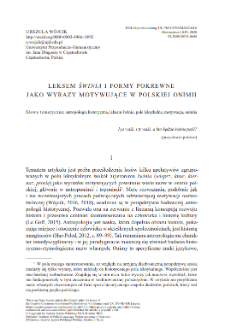- Search in all Repository
- Literature and maps
- Archeology
- Mills database
- Natural sciences
Advanced search
Advanced search
Advanced search
Advanced search
Advanced search

Object
Title: THE LEXEME ŚWINIA AND RELATED FORMS AS MOTIVATING WORDS IN POLISH ONYMY
Publisher:
Instytut Języka Polskiego Polskiej Akademii Nauk
Place of publishing:
Description:
Abstract:
The aim of the article is an attempt to trace the fate of several appellatives grouped in the lexical fieldaround the hyperonym świnia ʽpig, swine’ (wieprz ʽhog’, knur/kiernoz ʽboar’ and prosię ʽpiglet’) asthe motivation of many names in Polish onymy, mainly in anthroponymy and toponymy. My researchhas been conducted along the lines of historical anthropology. Proper names in this approach play animportant role in the reconstruction of the past. The field of interest of this article includes mainlynames belonging to the old onymic layer. Proper names arise from the lexicon of a given language,which is why my analysis is based on lexical and semantic methodology. My point of departure isthe meaning (often reconstructed) of appellative lexical units, including their semantic modificationsin the proprial layer. I interpret proper names on the basis of findings regarding their originand motivation. The first names motivated by the lexeme świnia were associated with the economicorganization of the Piast state. In the article I present the history of their creation. I go on to discussthe other lexemes which became the basis of many names belonging to different naming categories.The presence of etymons of interest to us in so many proper names during the Middle Ages allowsus to draw the conclusion that pigs played an extremely important role in the lives of our ancestors.
Relation:
Volume:
Start page:
End page:
Detailed Resource Type:
Format:
Resource Identifier:
10.17651/ONOMAST.64.6 ; oai:rcin.org.pl:162806
Language:
Language of abstract:
Rights:
Terms of use:
Copyright-protected material. May be used within the limits of statutory user freedoms
Access:
Object collections:
- Digital Repository of Scientific Institutes > Partners' collections > Institute of Polish Language PAS > Serials
- Digital Repository of Scientific Institutes > Partners' collections > Institute of Polish Language PAS > Filds of science > Humanities > Linguistics
- Digital Repository of Scientific Institutes > Partners' collections > Institute of Polish Language PAS > Filds of science > Humanities > Linguistics > Onomastics
- Digital Repository of Scientific Institutes > Partners' collections > Institute of Polish Language PAS > Offprint
- Digital Repository of Scientific Institutes > Literature > Journals/Articles
Last modified:
Feb 23, 2021
In our library since:
Feb 22, 2021
Number of object content downloads / hits:
904
All available object's versions:
https://rcin.org.pl./publication/196859
Show description in RDF format:
Show description in RDFa format:
Show description in OAI-PMH format:
| Edition name | Date |
|---|---|
| Leksem świnia i formy pokrewne jako wyrazy motywujące w polskiej onimii / Wójcik, Urszula | Feb 23, 2021 |
Objects Similar
Wójcik, Urszula
Wójcik, Urszula
Sikorski, Dariusz Andrzej
Dąbrowski, Piotr Zygmunt

 INSTYTUT ARCHEOLOGII I ETNOLOGII POLSKIEJ AKADEMII NAUK
INSTYTUT ARCHEOLOGII I ETNOLOGII POLSKIEJ AKADEMII NAUK
 INSTYTUT BADAŃ LITERACKICH POLSKIEJ AKADEMII NAUK
INSTYTUT BADAŃ LITERACKICH POLSKIEJ AKADEMII NAUK
 INSTYTUT BADAWCZY LEŚNICTWA
INSTYTUT BADAWCZY LEŚNICTWA
 INSTYTUT BIOLOGII DOŚWIADCZALNEJ IM. MARCELEGO NENCKIEGO POLSKIEJ AKADEMII NAUK
INSTYTUT BIOLOGII DOŚWIADCZALNEJ IM. MARCELEGO NENCKIEGO POLSKIEJ AKADEMII NAUK
 INSTYTUT BIOLOGII SSAKÓW POLSKIEJ AKADEMII NAUK
INSTYTUT BIOLOGII SSAKÓW POLSKIEJ AKADEMII NAUK
 INSTYTUT CHEMII FIZYCZNEJ PAN
INSTYTUT CHEMII FIZYCZNEJ PAN
 INSTYTUT CHEMII ORGANICZNEJ PAN
INSTYTUT CHEMII ORGANICZNEJ PAN
 INSTYTUT FILOZOFII I SOCJOLOGII PAN
INSTYTUT FILOZOFII I SOCJOLOGII PAN
 INSTYTUT GEOGRAFII I PRZESTRZENNEGO ZAGOSPODAROWANIA PAN
INSTYTUT GEOGRAFII I PRZESTRZENNEGO ZAGOSPODAROWANIA PAN
 INSTYTUT HISTORII im. TADEUSZA MANTEUFFLA POLSKIEJ AKADEMII NAUK
INSTYTUT HISTORII im. TADEUSZA MANTEUFFLA POLSKIEJ AKADEMII NAUK
 INSTYTUT JĘZYKA POLSKIEGO POLSKIEJ AKADEMII NAUK
INSTYTUT JĘZYKA POLSKIEGO POLSKIEJ AKADEMII NAUK
 INSTYTUT MATEMATYCZNY PAN
INSTYTUT MATEMATYCZNY PAN
 INSTYTUT MEDYCYNY DOŚWIADCZALNEJ I KLINICZNEJ IM.MIROSŁAWA MOSSAKOWSKIEGO POLSKIEJ AKADEMII NAUK
INSTYTUT MEDYCYNY DOŚWIADCZALNEJ I KLINICZNEJ IM.MIROSŁAWA MOSSAKOWSKIEGO POLSKIEJ AKADEMII NAUK
 INSTYTUT PODSTAWOWYCH PROBLEMÓW TECHNIKI PAN
INSTYTUT PODSTAWOWYCH PROBLEMÓW TECHNIKI PAN
 INSTYTUT SLAWISTYKI PAN
INSTYTUT SLAWISTYKI PAN
 SIEĆ BADAWCZA ŁUKASIEWICZ - INSTYTUT TECHNOLOGII MATERIAŁÓW ELEKTRONICZNYCH
SIEĆ BADAWCZA ŁUKASIEWICZ - INSTYTUT TECHNOLOGII MATERIAŁÓW ELEKTRONICZNYCH
 MUZEUM I INSTYTUT ZOOLOGII POLSKIEJ AKADEMII NAUK
MUZEUM I INSTYTUT ZOOLOGII POLSKIEJ AKADEMII NAUK
 INSTYTUT BADAŃ SYSTEMOWYCH PAN
INSTYTUT BADAŃ SYSTEMOWYCH PAN
 INSTYTUT BOTANIKI IM. WŁADYSŁAWA SZAFERA POLSKIEJ AKADEMII NAUK
INSTYTUT BOTANIKI IM. WŁADYSŁAWA SZAFERA POLSKIEJ AKADEMII NAUK




































